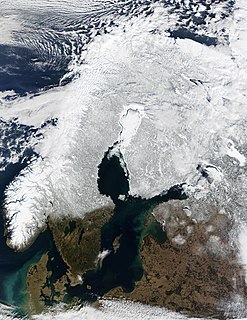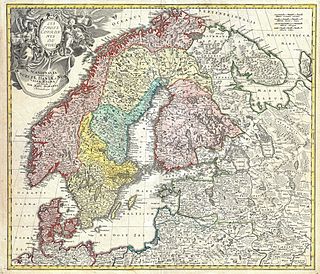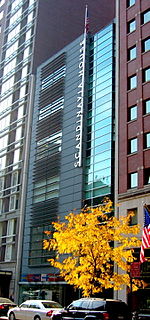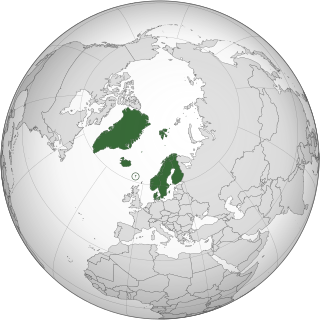
Scandinavia is a subregion in Northern Europe, with strong historical, cultural, and linguistic ties. The term Scandinavia in local usage covers the three kingdoms of Denmark, Norway, and Sweden. The majority national languages of these three belong to the Scandinavian dialect continuum, and are mutually intelligible North Germanic languages.
A startup or start-up is a company or project undertaken by an entrepreneur to seek, develop, and validate a scalable economic model. While entrepreneurship refers to all new businesses, including self-employment and businesses that never intend to become registered, startups refer to new businesses that intend to grow large beyond the solo founder. Startups face high uncertainty and have high rates of failure, but a minority of them do go on to be successful and influential. Some startups become unicorns; that is privately held startup companies valued at over US$1 billion.
AIESEC is an international youth-run, non-governmental and not-for-profit organization that provides young people with leadership development, cross-cultural internships, and global volunteer exchange experiences. The organization focuses on empowering young people to make a progressive social impact. The AIESEC network includes approximately 35,000 members in 120+ countries.
A business incubator is a company that helps new and startup companies to develop by providing services such as management training or office space. The National Business Incubation Association (NBIA) defines business incubators as a catalyst tool for either regional or national economic development. NBIA categorizes their members' incubators by the following five incubator types: academic institutions; non-profit development corporations; for-profit property development ventures; venture capital firms, and combination of the above.

The history of Scandinavia is the history of the geographical region of Scandinavia and its peoples. The region is in northern Europe, and consists of Denmark, Norway, and Sweden. Finland and Iceland are at times, especially in English-speaking contexts, considered part of Scandinavia.

The American-Scandinavian Foundation (ASF), is an American non-profit foundation dedicated to promoting international understanding through educational and cultural exchange between the United States and Denmark, Finland, Iceland, Norway, and Sweden. The Foundation's headquarters, Scandinavia House: The Nordic Center in America, is located at 58 Park Avenue, New York City.
The Nordic model comprises the economic and social policies as well as typical cultural practices common to the Nordic countries. This includes a comprehensive welfare state and multi-level collective bargaining based on the economic foundations of social corporatism, with a high percentage of the workforce unionized and a large percentage of the population employed by the public sector. Although it was developed in the 1930s under the leadership of social democrats, the Nordic model began to gain attention after World War II.

The Nordic countries, or the Nordics, are a geographical and cultural region in Northern Europe and the North Atlantic, where they are most commonly known as Norden. The region includes the sovereign states of Denmark, Finland, Iceland, Norway and Sweden, as well as the autonomous countries of the Faroe Islands and Greenland, which are both part of the Kingdom of Denmark. The Åland Islands, an autonomous region of the Republic of Finland; Jan Mayen island and the archipelago of Svalbard, both unincorporated areas of Metropolitan Norway, are also included. Bouvet Island, a dependency of the Kingdom of Norway, is sometimes not considered a part of the Nordic countries due to its remote geographical location. Several regions in Europe such as the Northern Isles of Scotland and Estonia share cultural and ethnic ties with the Nordic nations, but are not considered to be part of the Nordic countries today. Scandinavians, who comprise over three quarters of the region's population, are the largest group, followed by Finns, who comprise the majority in Finland; other ethnic groups are the Greenlandic Inuit, the Sámi people, and recent immigrants and their descendants. The native languages Danish, Norwegian, Swedish, Icelandic, and Faroese are all North Germanic languages rooted in Old Norse. Native non-Germanic languages are Finnish, Greenlandic languages and several Sámi languages. The main religion is Lutheran Christianity.
Entrepreneurship Cell, IIT Kharagpur (E-Cell) is a non-profit student’s organization dedicated to promoting the spirit of entrepreneurship among students throughout India. Established in 2006 under the aegis of STEP, IIT Kharagpur, E-Cell has since been involved in more than 70 startup companies in the initial stages of their existence. It is a student body under Rajendra Mishra School of Engineering Entrepreneurship (RMSOEE), IIT Kharagpur and has taken up various initiatives to promote new ventures by students of IIT Kharagpur and students across the country.
The IRIS Association is a non-profit organization aiming to promote research and research education in the use, development and management of information systems in Scandinavia, and making that research known in the international research community and among practitioners. The IRIS association publishes the Scandinavian Journal of Information Systems (SJIS) and holds the IRIS Conference as well as the Scandinavian Conference on Information Systems Conference (SCIS). Its current president is Judith Molka-Danielsen (2011-2013).
The Startup Visa is a temporary conditional residence permit in different countries. It aims at introducing a visa category for entrepreneurs raising outside funding and converts to a permanent residency visa if certain conditions are met.
An entrepreneurial ecosystems or entrepreneurship ecosystems are peculiar systems of interdependent actors and relations directly or indirectly supporting the creation and growth of new ventures. Ecosystems including the social and the economic environment affect local or regional entrepreneurship. Businesses located within places serving as incubators for creativity, innovation, and entrepreneurship have a greater chance of success.
Startup accelerators, also known as Seed accelerators, are fixed-term, cohort-based programs, that include mentorship and educational components and culminate in a public pitch event or demo day. While traditional business incubators are often government-funded, generally take no equity, and focus on biotech, financial technology (FinTech), medical technology (MedTech), clean tech or product-centric companies, accelerators can be either privately or publicly funded and cover a wide range of industries. Unlike business incubators, the application process for seed accelerators is open to anyone, but highly competitive. There are specific types of seed accelerators, such as corporate accelerators, which are often subsidiaries or programs of larger corporations that act like seed accelerators.
Women 2.0 is a global network and social platform for aspiring and current female founders of technology ventures. It was founded in April 2006 and primarily provides an incubator for ideas program for engineers, designers, business, and marketing participants who want to launch and develop their own high-technology ventures.

The Entrepreneurship Cell, IIT Bombay, also known as E-Cell, IIT Bombay, is the primary entrepreneurship promoting body of the Indian Institute of Technology Bombay, managed and run completely by the students of the institute. It organises initiatives like the annual business plan competition Eureka! and the flagship event, The Entrepreneurship Summit (E-Summit) in January each year, which receives a footfall of over 20000.

The Global Innovation through Science and Technology initiative (GIST) is a U.S. government program on innovation and entrepreneurship. The program assists businesspeople to establish startups. GIST participants in 135 emerging economies can develop skills, build networks, find mentors, and access financing through a combination of in-country training, a pitch competition, interactive online programming, and direct connections to U.S. experts. GIST helps create conditions for successful local entrepreneurship ecosystems and enables global youth to develop local solutions to local problems. GIST is also one of the key programs under President Obama's SPARK Initiative, an initiative under which programs are selected to represent the best work being done by the U.S. Government to advance entrepreneurship around the world.

The Founder Institute is an American business incubator, entrepreneur training and startup launch program that was founded in Palo Alto, California in 2009. Although based in Silicon Valley, The Founder Institute maintains chapters in over 180 cities and more than 65 different nations across the globe. It offers a four-month part-time program for new and early-stage entrepreneurs that helps them develop their business ideas and form a company. Among the key requirements for graduation is the creation of a fully operational company by the end of the four-month program. As of 2018, over 3,500 companies had been created from the program, which raised over $800M funding in total.

Conquest, an initiative by students at the Center for Entrepreneurial Leadership at BITS Pilani, Pilani Campus is India's first Student-Run Startup Launchpad. They work on helping the best founders build great businesses and raise money. Their program includes online mentoring to the 10 most exciting startups from across the country over 6 weeks, connecting them with field experts. Following this, the startups undergo a 10-day mentorship program in Bangalore, learning from people who have built great companies themselves and networking with India's biggest investors. Throughout these 10 days, we give them a great place to live and work together. The program ends with the Grand Finale where these startups pitch before India's biggest investment firms and media houses.
New Entrepreneurs Foundation (NEF), founded in 2010, is a London-based nonprofit organization that runs development programmes for aspiring entrepreneurs.
Nordic Entertainment Group is a pan-Nordic media and entertainment company headquartered in Stockholm.







